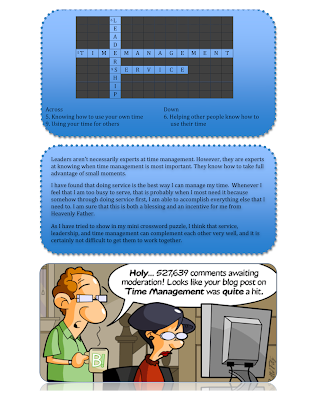
Friday, February 19, 2010
A Mosaic of Experiences

Wednesday, February 17, 2010

So I was thinking about time and using it well and I remembered a quote from Up. Yeah, I like movie quotes. Anyway, the quote goes like this: "It's the boring stuff I remember the most." I like it, because it's true. At least, partly. It seems that the simple things, like talking for a few minutes with someone who bothered to say hi, or delivering Christmas presents, or any of a hundred things that might seem to be so small and insignificant are really the most lasting memories. I may never remember what my teacher said about Hegel's Master-Slave dialectic today or what I read about Spanish literature, but I will remember the friends I ate lunch with today, the home teacher who gave me a ride home when it was too dark to walk, and the other little things that make life worth living.
The Little Girl Who DIDN'T Get Baptized!


All too frequently on my mission I saw both missionaries and investigators alike mistake one of the fundamental requirements for becoming a member of the Church of Jesus Christ of Latter-day Saints: baptism. Areas on my mission that hadn’t seen success in over a year always came with two problems. First was the temptation to believe that it wasn’t possible to baptize in that area. This led to trunky missionaries who had mentally checked out, but felt guilty enough to complete all the visible steps to finish their mission “honorably.” The second problem was that some missionaries viewed themselves as a sort of savior who had come to break the bonds of the baptizing curse. This second group often concerned me more than the first, because although their mission experience was good for them, the work they were doing was often not good for the mission. Frequently when the means of baptism were mistaken for the end goal of coming to Christ the new member was excommunicated within one year of his or her baptism (I know of two specific instances).
One particular companionship comes to mind. They were doing everything they could to force a little girl through the baptismal interview process as a way of padding statistics. The girl was from a family who was very much inactive. The missionaries found out that she wasn’t a member at the age of 9, and knew how easy it would be to try to exploit the situation for the sake of getting someone into the waters of baptism. As the district leader I remember distinctly having to talk to them about our purpose as missionaries. I reminded them that our purpose is to invite others to come to Christ, not to get them in the waters of baptism. We discussed how anyone coming to Christ must be baptized, but that not everyone who is baptized is necessarily coming to Christ. After much pondering and prayer we decided that it would be best to get the local branch leadership involved since they could help baptism become a long-term, covenant event, and not just a short splash in the pool.
I view leadership, service, and time management in a similar way. Both leadership and time management are means to giving service. Just because we are leaders, or just because we are able to manage out time well, does not mean that we are giving service. These are two tools for us to use in accomplishing greater goals. If we are not careful we can get in trouble for trying to lead, or manage our time, for the sake of leading and managing time. I believe that these activities should increase our ability and opportunity to give service. If they are unattached to service, however, they could very easily be talents that we bury in the sand.



The Sun Standeth Still...
 Considering this EXTREMELY busy week of midterms, in-laws, job interviews, bishopric meetings, projects, and papers...it's ironic that Maridee chose such an appropritate topic for this week's post. I'm sure that each and every one of you can relate on a very personal level to the week I've just described, and yet, somehow you're still going!!!! It is this topic that I wish to discuss in my post today.
Considering this EXTREMELY busy week of midterms, in-laws, job interviews, bishopric meetings, projects, and papers...it's ironic that Maridee chose such an appropritate topic for this week's post. I'm sure that each and every one of you can relate on a very personal level to the week I've just described, and yet, somehow you're still going!!!! It is this topic that I wish to discuss in my post today. choices we need to have inspired priorities and apply them in ways that will bring eternal blessings to us and to [others]."
choices we need to have inspired priorities and apply them in ways that will bring eternal blessings to us and to [others]." 
Tuesday, February 16, 2010
Bomb Toasted: Time and Leadership

I must follow the people. Am I not their leader?
Benjamin Disraeli
Disraeli perfectly illustrates how service and leadership are connected in this quote. Leaders are established and set in place to serve the needs of the people. When the leaders themselves forget this purpose, they have broken the contract with the people, and the people have an obligation to overthrow the sitting ruler. For leadership and service are inexorably connected. In fact, one could argue that the perfect form of leadership is also the perfect form of service. Namely, as Moroni states in Alma Chapter 60:
“Behold, I am Moroni, your chief captain. I seek not for power, but to pull it down. I seek not for honor of the world, but for the glory of my God, and the freedom and welfare of my country. And thus I close mine epistle.”
As Moroni states in being the chief captain, he does no t desire power, but rather to “pull it down,” serving his fellow men and God rather than chasing the accolades of the world.
On the subject of time management I was having a hard time integrating the concept with the service and the leadership aspects. While time management is crucial when being a leader, I felt like a poem was the perfect way to address the issue:
Time, A watch strapped to your arm.
Is FLASH MOB a Service?
- How does a flash mob promote leadership?
- What service does a flash mob provide?
- Is organizing a flash mob an effective use of time?
Monday, February 15, 2010
How did Christ connect leadership, service, and time management?
 Jesus was the best example of a service-oriented leader, but I’d never fully considered how he managed his time. Some thoughts:
Jesus was the best example of a service-oriented leader, but I’d never fully considered how he managed his time. Some thoughts:1. Christ was always teaching and serving no matter the activity. Whether he was dining with a Pharisee or walking from place to place, Christ focused on serving those around him and teaching through that service.
2. Christ took time out to ponder and pray. We see many times where he took time apart to commune with his Father and to consider his mission. He was still focused on what needed to be done, but in a way that would allow recuperation and rest.
3. Christ slept and ate when it was necessary. We see that he was sometimes so tired that he slept through much of a storm. We should remember to rest and eat as well.
4. Christ prepared. Christ spent his teen and young adult years preparing for his ministry, growing in stature and wisdom and in favor with God and man. He fasted and communed with his Father and was baptized. Everything was done in order so as to best fulfill the will of the Father.
5. Christ did not adhere too rigidly to a schedule. He was teaching and had purpose, but took time out to serve and heal. I think of the time when he said, “Suffer the little children to come unto me,” instead of turning them away because he was too busy with something else. To me this shows how we can have a goal, a desired outcome, but that we can allow some wiggle room in how we get there.
6. Christ taught the individual. He knew his disciples needed to bear up certain loads after he was gone, and he used his time to teach them what they needed to know for that time.
There are many more lessons, but this was a good list to ponder for me. I hope it helps those who read it as well.
















